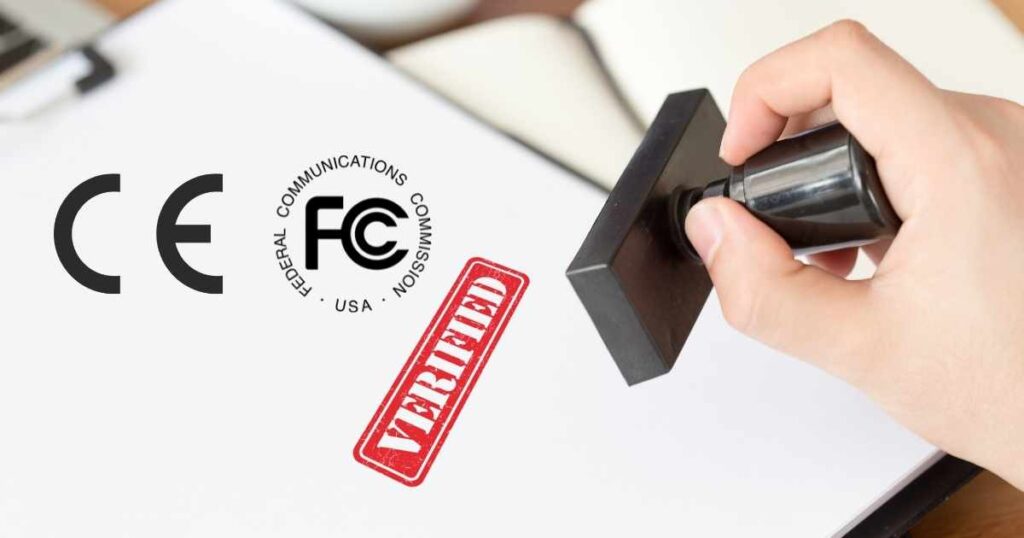If you are developing a new product, you need to pick standard off-the-shelf components and modules as much as possible and you need to consider compliance at this stage.
If your product will include electronic components and will need to be FCC certified and/or bear a CE mark, selecting components/modules that are already certified will save you time and money.
However, the question then becomes, how to make sure the certificates sent by suppliers are legitimate? I wrote some advice in this article.
(I was asked this question a few weeks ago in the Hardware Academy — an awesome resource for people working on a new electro-mechanical product — and I thought it would be interesting to readers of this blog, too.)
Who issues those certifications?
A certifying body issues the certification:
- In the case of FCC, a lab that is on the list of accredited labs issues a certificate and a test report.
- In the case of CE, a lab that is on the list of notified bodies also issues a certificate and a test report. You need to be a bit familiar with the different CE directives, since the notified bodies are not accredited to issue all types of CE certifications.
What company name is typically on the certificate?
In many cases, the company name mentioned on the certificate might be that of the manufacturer or of the product owner. If you see the name is not that of your supplier, or if the product reference is not that of the component you intend to buy, make sure they give you a very good explanation for it… these are usually red flags.
By the way, if you end up paying for a certificate, you will want YOUR name to be on the cert if possible.
What to check when looking at the certificate?
Here are a few tips:
- Make sure it’s in pdf. Not a photoshopped image…
- Make sure it’s not too old. If it’s 3+ years old, that’s usually not good!
- Is the lab on the right list (is it accredited to issue such a cert)?
- Request the test report, not just the certificate. Do the photos, and the list of components (with markings) correspond to the exact product/module you are about to buy?
- In the report, is there a Fail result?
- Contact the issuer, and get them to confirm this cert corresponds to this company name and it is legit. The big labs have a website for it, for example: https://www.intertek.com/business-assurance/certificate-validation/.
Is this sufficient?
In short, no.
If the supplier doesn’t inspire a lot of confidence, make sure you test your first batch. Yes, that’s in addition to the certificate they sent you before — you need to confirm they are selling you what they promised.
For that purpose, make sure to read The Basics about Laboratory Tests Every Importer Should Know. Here are the general tips we outlined:
Never use a laboratory proposed by your supplier. They could bribe the lab for positive results. And some Chinese labs’ sales staff promise to local factories “don’t worry, we guarantee you get a passed report that you can show to your customer”.
Test production samples that are randomly selected by a third party. They should never be ‘chosen’ by your supplier. The risk that they send a different product (either from another batch, or made separately with different components and/or a different workmanship) is too high.
Select a lab with an ISO17025 certification issued by a reputable organization, or use a famous international lab.
If practical, select a lab that is close to your supplier. It will save time in your overall process and will reduce logistical risks. There are labs virtually everywhere in China if you work in a common product category.
Smaller, local labs are often cheaper than international labs. Some local labs are suitable for very standard tests, but are generally not recommended for very specific tests (for instance, checking the chemical composition of a compound).
A laboratory’s fees can start from less than 100 USD for a simple test, and can exceed 100,000 USD (with certification lead times of 6 months) for multinational safety regulations. Careful planning and budgeting is a critical part of the process.
And, finally, don’t focus only on compliance. Ask if they have a reliability test report, how long it’s been sold and in what volumes, when is the planned end of life, etc.
******
Do you have any questions about FCC certification or CE certification? Let me know by leaving a comment.
P.S.
You might also like this blog post on Sofeast.com: 11 Common Electronic Product Certification And Compliance Requirements
Disclaimer
We are not lawyers. What we wrote above is based only on our understanding of the regulatory requirements. QualityInspection.org does not present this information as a basis for you to make decisions, and we do not accept any liability if you do so.


